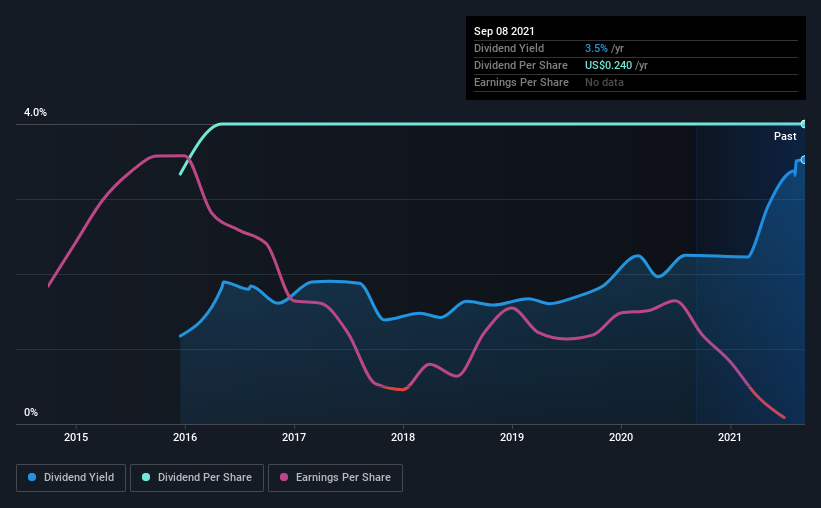Don't Buy Heritage Insurance Holdings, Inc. (NYSE:HRTG) For Its Next Dividend Without Doing These Checks
Some investors rely on dividends for growing their wealth, and if you're one of those dividend sleuths, you might be intrigued to know that Heritage Insurance Holdings, Inc. (NYSE:HRTG) is about to go ex-dividend in just four days. The ex-dividend date is one business day before the record date, which is the cut-off date for shareholders to be present on the company's books to be eligible for a dividend payment. The ex-dividend date is of consequence because whenever a stock is bought or sold, the trade takes at least two business day to settle. Accordingly, Heritage Insurance Holdings investors that purchase the stock on or after the 14th of September will not receive the dividend, which will be paid on the 6th of October.
The company's next dividend payment will be US$0.06 per share, and in the last 12 months, the company paid a total of US$0.24 per share. Last year's total dividend payments show that Heritage Insurance Holdings has a trailing yield of 3.5% on the current share price of $6.81. If you buy this business for its dividend, you should have an idea of whether Heritage Insurance Holdings's dividend is reliable and sustainable. That's why we should always check whether the dividend payments appear sustainable, and if the company is growing.
See our latest analysis for Heritage Insurance Holdings
If a company pays out more in dividends than it earned, then the dividend might become unsustainable - hardly an ideal situation. Heritage Insurance Holdings reported a loss after tax last year, which means it's paying a dividend despite being unprofitable. While this might be a one-off event, this is unlikely to be sustainable in the long term.
Click here to see the company's payout ratio, plus analyst estimates of its future dividends.
Have Earnings And Dividends Been Growing?
Businesses with shrinking earnings are tricky from a dividend perspective. Investors love dividends, so if earnings fall and the dividend is reduced, expect a stock to be sold off heavily at the same time. Heritage Insurance Holdings was unprofitable last year and, unfortunately, the general trend suggests its earnings have been in decline over the last five years, making us wonder if the dividend is sustainable at all.
The main way most investors will assess a company's dividend prospects is by checking the historical rate of dividend growth. Heritage Insurance Holdings has delivered 3.1% dividend growth per year on average over the past six years.
Remember, you can always get a snapshot of Heritage Insurance Holdings's financial health, by checking our visualisation of its financial health, here.
To Sum It Up
Is Heritage Insurance Holdings an attractive dividend stock, or better left on the shelf? It's hard to get past the idea of Heritage Insurance Holdings paying a dividend despite reporting a loss over the past year - especially when the general trend in its earnings also looks to be negative. These characteristics don't generally lead to outstanding dividend performance, and investors may not be happy with the results of owning this stock for its dividend.
Having said that, if you're looking at this stock without much concern for the dividend, you should still be familiar of the risks involved with Heritage Insurance Holdings. In terms of investment risks, we've identified 2 warning signs with Heritage Insurance Holdings and understanding them should be part of your investment process.
A common investment mistake is buying the first interesting stock you see. Here you can find a list of promising dividend stocks with a greater than 2% yield and an upcoming dividend.
This article by Simply Wall St is general in nature. We provide commentary based on historical data and analyst forecasts only using an unbiased methodology and our articles are not intended to be financial advice. It does not constitute a recommendation to buy or sell any stock, and does not take account of your objectives, or your financial situation. We aim to bring you long-term focused analysis driven by fundamental data. Note that our analysis may not factor in the latest price-sensitive company announcements or qualitative material. Simply Wall St has no position in any stocks mentioned.
Have feedback on this article? Concerned about the content? Get in touch with us directly. Alternatively, email editorial-team (at) simplywallst.com.

